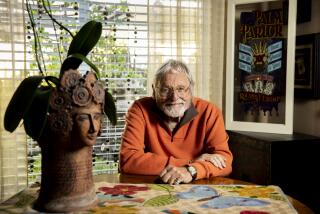My father: A man of note and passion
- Share via
UNTIL I WAS about 10 years old, I didn’t know what my father did for a living. I knew what he did -- smoked cigarettes, went to a lot of meetings, pored over stacks of papers and memos written in his almost illegible hand, talked seriously on the phone until late into the night.
I knew his job was important, certainly too important to discuss with children. I knew it couldn’t be easily described or accomplished in eight-hour shifts and that it was not a good candidate for show-and-tell presentations at school.
For the record:
12:00 a.m. June 16, 2006 For The Record
Los Angeles Times Friday June 16, 2006 Home Edition California Part B Page 13 Editorial Pages Desk 0 inches; 29 words Type of Material: Correction
Race relations: A June 14 column by Erin Aubry Kaplan stated that the Los Angeles County Commission on Human Relations was formed in 1967. It was formed in 1958.
Though I occasionally wished that my father did something more quantifiable -- electrician, chef, car salesman -- I also was impressed by the mystery and urgency of what was clearly not his job but his work. Whatever he did, I knew he did it because he had to; the endless meetings and smoke-filled conversations were key elements of an art form that he strove to perfect but seemed destined never to get quite right.
When he did take a break from work, he played jazz and classical melodies on the trumpet that he’d been playing since he was 15. Music had been my father’s first vocation, but he put it aside for practical reasons that quickly evolved into political ones. After he got married in the late 1950s, the civil rights movement that had been building for years began breaking out in earnest, and he had to claim his place in it.
But the music didn’t go away, and though he never did it again for a living, my father always played seriously. During many of his “breaks,” he would sit in a worn blue chair in the family room, refining and re-refining notes and phrases as intently as he’d been studying papers and memos moments before.
My father, Larry, is an activist. In another era, he would have been called a “race man.” He spent 34 years working for Los Angeles County, most of them as a consultant for the Human Relations Commission, which formed in 1967 and inspired many cross-cultural and community groups that came after.
My father’s “job” was just about impossible: to improve conditions for dangerously disenfranchised black folk by bringing folks of all colors together -- and by any other means he thought necessary. He began ethnic coalition-building long before it became fashionable -- black/Jewish, black/Latino, black/Korean, you name it. And he’s the first to say that the whole enterprise was not only imperfect but a colossal failure. Still is.
That isn’t to say that there weren’t or aren’t good people out there doing worthwhile work, or that nobody’s benefited from it. But not enough people have benefited, or they haven’t benefited enough. By “they” I mean mostly blacks, whose conditions in L.A. today are as dire as they were 40 years ago, collectively speaking -- which is the only language my father speaks. Too many sour notes to be anywhere near a great performance, or even a good one.
My father is not sentimental about the failure. He isn’t distraught. He has seen and experienced too much for that, coming as he does from a big New Orleans family that battled racism daily in the South.
Sometimes he allows that he is disappointed in the dearth of change -- this is Los Angeles, after all, not the South. This is the place where blacks came to re-imagine themselves, the last big American city where that felt not only possible but likely.
But my father doesn’t have the time or energy to waste contemplating what hasn’t been done -- not when there is so much left to do. At 72, he’s not only still serving on a million committees, he’s joining new ones.
I frankly don’t know how he keeps it up. That’s the funny thing -- although I now understand his work, how he continues to do it in such racially disorienting and discordant times is as big a mystery to me as ever. My best guess is that his stamina is less about ideology than about the way he’s made. Through good times and bad, he’s never rested or compromised a vision that, while collective in spirit, is uniquely his.
But time has some rewards. For the last 10 years or so, my father and I have been discussing his work in detail. He expects my input and, increasingly, my plan of action. He is passing on some of the faith that his generation was raised on, the same faith that my generation put away on a high shelf as something to be saved for hard times, or used at our discretion.
Now that faith feels everyday to me. It is music that’s audible through the din of so many things -- war, corruption, indifference, uncertainty. The music is hardly pretty itself, unfinished. But it plays.


